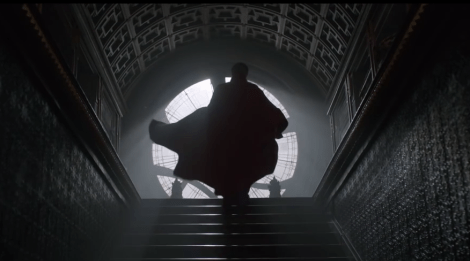 A few years ago, a relative of mine went with her co-workers to visit a fortune-teller. She said she had gone because she wanted to know who had stolen her purse the month before. She and her friends sat in the psychic’s shop that afternoon, and were given predictions and answers about life one by one. The fortune teller told one woman in the group to brace herself for a tragedy that was soon to take place in her family. Her brother-in-law passed away two months later. She also explained to another woman exactly how her husband had died in a boating accident years before. She told my family member who had stolen her purse. All of it was found to be true.
A few years ago, a relative of mine went with her co-workers to visit a fortune-teller. She said she had gone because she wanted to know who had stolen her purse the month before. She and her friends sat in the psychic’s shop that afternoon, and were given predictions and answers about life one by one. The fortune teller told one woman in the group to brace herself for a tragedy that was soon to take place in her family. Her brother-in-law passed away two months later. She also explained to another woman exactly how her husband had died in a boating accident years before. She told my family member who had stolen her purse. All of it was found to be true.
When the story was related to me, it was insisted that this clairvoyant’s power must have been from God because everything came true. If the predictions were wrong, she said, it would not be from God. In her mind, how could it not be something godly if the fortune teller miraculously found answers from out of nowhere?
I’ll admit that I’m nowhere near an expert on magic and the occult in real life, so just bear with me as we go here.
My response to my relative’s story was a story from the book of Exodus. When Moses had been imbued with divine power and commissioned by God to free the people of Israel, he goes to Pharaoh to relay God’s message. In order to demonstrate God’s power before the Egyptians, Moses asks Aaron to throw his staff on the ground and it promptly turns into a snake. Pharaoh’s reaction?
Big deal.
Pharaoh says his priests can do the same thing. They throw their staffs on the ground and also turn into snakes! Moses’ snake eats the other snakes and God’s power is affirmed, but what is also affirmed through this story is that there is power that is sometimes harnessed by human beings which is not from God. (Exodus 7)
Naturally, the next question that follows is, “If it’s not from God, then where is it from?”
The answer is less simple, but suffice to say, as Orthodox Christians, we do believe that there is good in the world, and there is evil in the world. Good has nothing to do with evil, nor is evil a necessary counterbalance (a la Yin-Yang), but more a “side effect” of good. Good is accessible to all human beings as we have been created by God to be good, but evil is also accessible. Some have even chosen to contact evil, and try to harness its power, either for evil purposes or for good purposes.
(Just bear with me here, I promise that will eventually make sense.)
In both the Old and New Testaments, there are several references to “magicians” and “sorcerers” and “mediums,” etc. Some may dismiss these today as mere superstition or just folk tales, similar to tribal religions and cults today. But the reality is these are references, albeit vague ones, to those who try to access power that is not from God for their own purposes. As I was told by a monk on Mount Athos when he was giving my classmates and I a tour some years ago, “Whether white magic or black magic, we don’t touch it because both derive their source from evil.”
Obviously, this is not a topic we talk about much nowadays, so I don’t blame anyone for thinking this is pure craziness. The reality is, referring back to my earlier statement about God’s power, we don’t need to know the intricacies or details about evil, just that it’s there and God and good are more powerful.
Still with me? Haven’t clicked to another page? Okay then.
There is, of course, a difference between real magic practices and fictionalized magic, a la Disney movies, Lord of the Rings, the Chronicles of Narnia, Mary Poppins, the Smurfs, or children’s fairy tales of some kind or another. These may or may not have had some piece of its origin in something real, but when they are turned into movies or kids books they have nothing to do with evil, demons, or the occult. They’re meant to just be make-believe stories with nothing pagan or spiritual about them. I liken it to a kid dressing up like Superman for Halloween- it may have been some kind of pagan ritual a long time ago (or perhaps today), but has nothing to do with anything pagan by itself (my two cents, anyway). Even much of Christian liturgical worship over the years has its origins in ancient pagan practices, but as I heard it explained once, “We take the format, not the content.”

When it comes to comic books, magic-themed characters have been around for almost as long as comics themselves, many predating superheroes. Most of the time, their stories are as innocent and as harmless as the kids’ properties I mentioned earlier, but in the hands of some writers, the stories are heavily influenced by magic practices in real life. In the case of Doctor Strange, originally created by Stan Lee and Steve Ditko in 1963, the first ten years of his stories were extremely fictionalized and a ton of fun. Although terms like “black magic” and “occult” are thrown in, I don’t know of any real life magician that uses spells like “by the hoary hosts of Hoggoth!”or wears a cloak of levitation. In fact, Stan Lee once dismissed a group of Doctor Strange fans from the Marvel offices who had wanted to find out what religion Stan was basing his stories on, simply saying “I made it all up! Go home!”
I just about jumped out of my shoes when I heard a Doctor Strange movie was being made, as I’ve always loved the character, and hit the ceiling when Benedict Cumberbatch was cast in the lead role. After the excitement settled down, I got a bit worried about what kind of Doctor Strange stories the movie would be based on. Thankfully, the innocent Lee/Ditko stories prevailed, with scifi-ish spells and superhero action, which made for a great movie.

When put in its proper place, that is, fiction, the idea of magic in fantasy stories can be a lot of fun. We should be cautious however, when something seemingly innocent draws from real sources, even if (I would think… and hope) it is unbeknownst to the people putting it together. I’d encourage everyone to do a little reading and get a little guidance from your priest on what these potential “red flags” might be, even if a rare occurrence (Ouija boards and even some Harry Potter content would be on that list for me). I would also encourage parents, in particular, to pray on what content to show our children and ourselves, for that matter. In the meantime, let us always remember that the Cross is the most powerful weapon in the history of creation, and when it’s all said and done, good wins.
Still there? Awesome…
Go see Doctor Strange if you haven’t! 🙂
“Let the Lord be glorified…” – Isaiah 66:5

